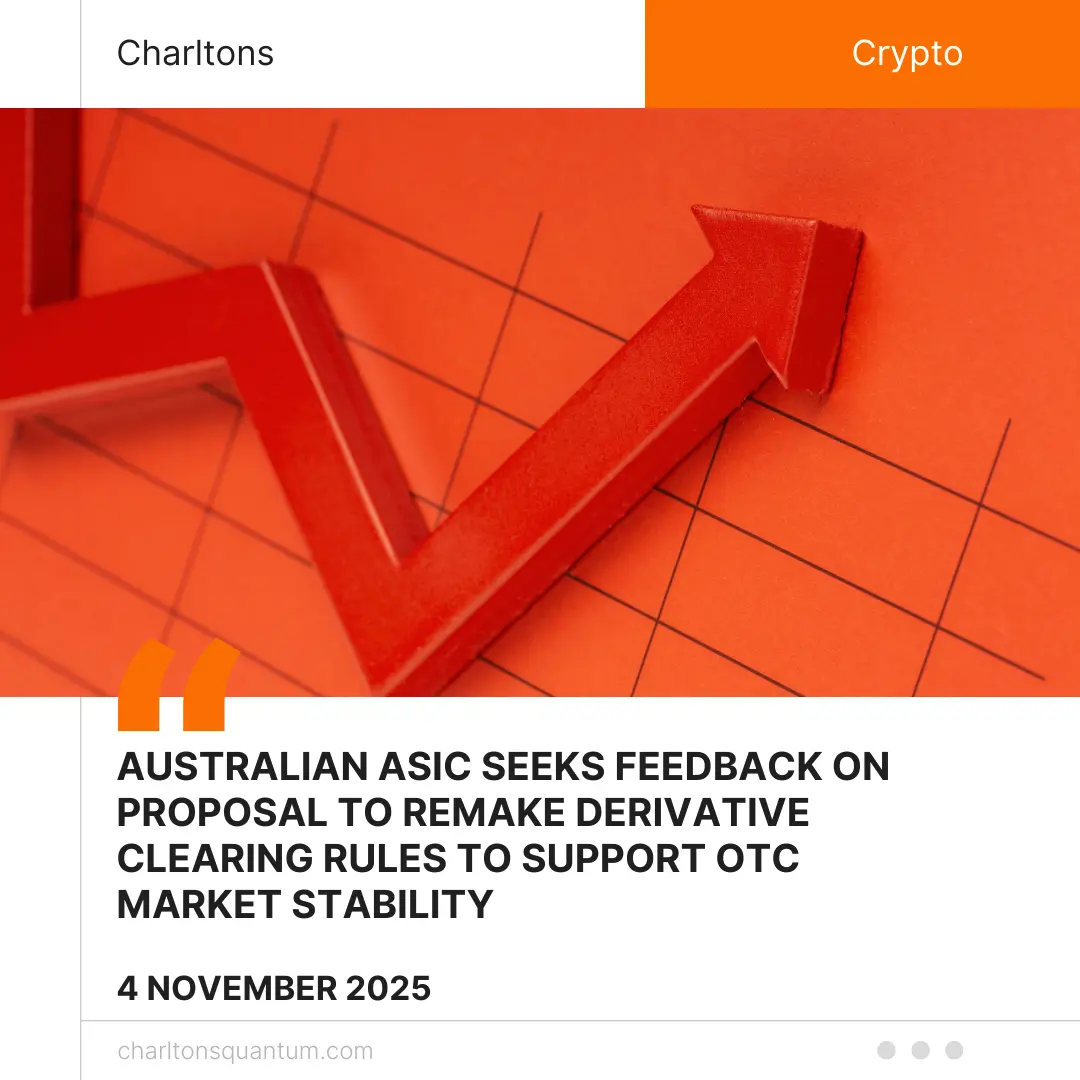
Swiss FINMA Opens Consultation on Risk Diversification and Liquidity Ordinances for Banks and Securities Firms
On 3 July 2025, the Swiss Financial Market Supervisory Authority (FINMA) opened a public consultation on two new ordinances: the Ordinance on the Risk Diversification of Banks and Securities Firms (RDO-FINMA) and the Ordinance on the Liquidity of Banks and Securities Firms (LiqO-FINMA). These ordinances will replace three existing FINMA circulars and are scheduled to take effect from 1 January 2027.
- The consultation will run until 29 September 2025, and is launched under Article 7(1) of the Swiss Financial Market Supervision Act (FINMASA).
- The new ordinances will replace FINMA Circulars 2019/1 (Risk Diversification), 2013/7 (Intra-Group Position Limits), and 2015/2 (Liquidity Risks).
- FINMA confirms the content is largely consistent with existing circulars, with technical updates reflecting Basel III reforms and industry engagement.
- RDO-FINMA incorporates refinements aligned with the Basel III standardised approach for market risk, effective globally since 1 January 2025, and clarifies treatment of guarantees from foreign group entities.
- LiqO-FINMA transposes and upgrades content from Circular 2015/2 and incorporates requirements from the Federal Council’s LiqO, including rules tied to the Swiss “too big to fail” (TBTF) regime.
- The new framework aims to consolidate FINMA’s secondary legislation and improve regulatory clarity and consistency without imposing substantial new burdens.
- Banks, securities firms, and industry associations are invited to provide feedback by 29 September 2025, with implementation slated for 1 January 2027.
To read this news in detail click here
UK FCA Chief Data Officer Jessica Rusu Delivers Policy Remarks on AI Regulation and Innovation at City Week 2025
On 1 July 2025, Jessica Rusu, Chief Data, Information and Intelligence Officer at the UK Financial Conduct Authority (FCA), delivered a keynote address titled “Harnessing AI and technology to deliver the FCA’s 2025 strategic priorities” during the AI and Digital Innovation Summit at City Week 2025. Her speech discussed the UK FCA’s pro-innovation, pro-growth approach to regulating artificial intelligence in financial services, adding that no new AI-specific regulations are currently needed, with existing regimes such as the Senior Managers Regime and Consumer Duty being sufficient. Rusu also discussed upcoming initiatives such as the AI Live Testing programme and the Supercharged Sandbox to support safe and scalable AI use.
- The UK FCA believes current frameworks like the Senior Managers Regime and Consumer Duty already provide effective oversight of AI in financial services. Firms can rely on these existing rules when deploying AI solutions.
- Supercharged Sandbox launches in October 2025, in partnership with Nvidia, the UK FCA will provide enhanced computing power, datasets, and test environments to firms using AI for purposes such as financial inclusion, fraud prevention, and wellbeing.
Applications are open until 11 August 2025. - AI Live Testing applications open in July 2025, to help firms test AI use cases under close UK FCA guidance. It aims to provide regulatory comfort before full-scale deployment. Collaboration begins in September 2025.
- AI Lab continues to drive innovation, launched in October 2024, is actively supporting responsible AI through programmes like AI Sprint, Input Zone, and Spotlight, encouraging industry-wide collaboration and use-case development.
- Synthetic Data Expert Group’s second report expected in 2025, UK FCA will soon release updated guidance on using synthetic data to test and train AI systems safely and legally.
- New support for FinTech scale-ups coming, later in 2025, the UK FCA plans to announce additional regulatory support to help FinTech firms scale AI-powered financial services responsibly.
- UK FCA’s internal AI adoption is growing as thew regulator itself is now using large language models (LLMs) to analyse text during authorisation and supervision processes, and has deployed AI voice bots to guide consumers to services like FOS and FSCS.
- Rusu encouraged firms to reach out to the UK FCA early if they’re unsure about their AI use cases. The regulator remains committed to supporting innovation while maintaining trust and market integrity.
- According to Rusu, innovation is embedded in the UK FCA’s 2025–30 Strategy, supporting four pillars: attracting new customers, combating financial crime, enhancing regulatory efficiency, and driving economic growth.
To read this news in detail click here
Singapore MAS Imposes S$960,000 in Composition Penalties on Five Payment Institutions for AML/CFT Breaches in Q2 2025
On 1 July 2025, the Monetary Authority of Singapore (MAS) published its Q2 2025 enforcement update, revealing that it had imposed composition penalties totalling S$960,000 on five Major Payment Institutions for breaching Anti-Money Laundering and Counter-Financing of Terrorism (AML/CFT) requirements under the SG Payment Services Act 2019.
- The penalised entities are, Remsea Pte Ltd, Arcade Plaza Traders Pte Ltd, J-Dee Remittance Services Pte Ltd, Mobile Community Tech Pte Ltd, and OxPay SG Pte Ltd.
- All five were found to have violated obligations under MAS AML/CFT notices applicable to Major Payment Institutions.
- MAS cited non-compliance with anti-money laundering controls and counter-terrorism financing obligationsas the grounds for action.
- Although the exact nature of each firm’s breaches was not detailed, MAS noted the regulatory seriousness and potential systemic risk posed.
To read this news in detail click here
US CFTC Issues Comprehensive FAQ Guidance on Futures Commission Merchant Registration and Compliance Obligations
On 30 June 2025, the US Commodity Futures Trading Commission (CFTC) released an Frequently Asked Questions guidance to clarify registration and compliance obligations for Futures Commission Merchants (FCMs). The FAQ is issued by the Market Participants Division, for firms looking to enter the derivatives space, especially via acquisitions and reinforces core duties under the US Commodity Exchange Act and CFTC regulations (17 CFR Chapter I).
- Entities soliciting or accepting futures, options, swaps, or retail forex trades while receiving customer funds must register as FCMs and join the National Futures Association (NFA).
- FCM applicants must file Form 7-R for the entity, and Form 8-R plus fingerprint cards for individuals, with NFA conducting background checks under Sections 8a(2) and 8a(3).
- Associated persons must pass the Series 3 exam, and those involved in swaps must complete NFA’s Swaps Proficiency Requirements.
- FCMs must retain trading records, communications, original documents, and daily ledgers accessible to the US CFTC and DOJ, with supervisory offices based in the US or approved jurisdictions.
- Written compliance policies must cover AML, cybersecurity, ethics, supervision, and continuity planning, and firms must appoint a qualified Chief Compliance Officer under 17 CFR §3.3.
- FCMs must meet minimum net capital thresholds, the highest of $1 million, 8% of margin required, SEC capital if dual-registered, $20 million for forex/swap activity, or $100 million if using internal risk models.
- Required reports include daily segregation calculations, annual audited financials, and CFTC Form 1-FR-FCM or SEC FOCUS Reports (for dual registrants).
- FCMs must operate written risk management programs, designate an independent risk unit, and submit quarterly risk exposure reports covering market, credit, liquidity, operational, and segregation risks.
- The FCM’s board or managing body must approve risk frameworks, set residual interest amounts, and authorise significant withdrawals; board members may be liable for violations.
- Chief Compliance Officers must implement controls, address conflicts, oversee compliance breaches, and file a sworn annual CCO report detailing governance, policies, and assessments.
- AML compliance under the Bank Secrecy Act and 31 CFR Chapter X includes written programs approved by senior management, due diligence, and mandatory Suspicious Activity Reports to FinCEN.
- In bankruptcy, Part 190 of CFTC Regulations and the US Bankruptcy Code provide fund segregation, priority claims treatment, and define “customer property,” though no SIPC-like insurance applies.
To read this news in detail click here
US CFTC Issues No-Action Letter for MIAX Futures on Derivatives Trading of Wheat Options
On 25 June 2025, the United States Commodity Futures Trading Commission (US CFTC) issued No-Action Letter No. 25-17, granting temporary relief to MIAX Futures Exchange, LLC to facilitate block trading of Minneapolis Hard Red Spring Wheat (HRSW) options on futures in the absence of an electronic trading system.
- The No-Action relief, allows MIAX Futures to conduct block trades of HRSW options on futures exclusively through non-centralised execution.
- The relief addresses the transitional issue arising from the migration of HRSW futures to MIAX’s Onyx platform on 29 June 2025, which temporarily disables electronic trading for HRSW options.
- The temporary protocol lowers the block trade minimum size from 15 contracts to 1 and permits participation by non-Eligible Contract Participants (non-ECPs)—a notable exception under DCM rules.
- Relief applies only to September and December 2025 HRSW options expirations, effective from 29 June 2025 to 29 August 2025.
- MIAX Futures must meet specific compliance conditions, including:
- Posting rule amendments on its website,
- Identifying such amendments as temporary and linked to this no-action relief,
- Responding to any US CFTC data or monitoring requests,
- Notifying the CFTC in advance of restoring electronic trading functionality.
- MIAX’s Market Regulation Department will oversee execution fairness, using:
- Comparative trade data,
- Settlement prices, and
- A proprietary options pricing application to prevent manipulation or price distortion.
To read this news in detail click here
Hong Kong HKMA and HK SFC Publish Joint Consultation Conclusions on Annual Update to Financial Services Providers List under the OTC Derivatives Regulatory Regime
On 26 June 2025, the Hong Kong Monetary Authority (HKMA) and the Hong Kong Securities and Futures Commission (HK SFC) jointly issued the Consultation Conclusions on the Annual Update to the Financial Services Providers List under the OTC Derivatives Regulatory Regime. The updated Financial Services Providers List (FSP List) will take effect on 1 January 2026, following its gazettal in Q4 2025.
- The updated FSP List forms part of the statutory clearing framework under the Hong Kong Securities and Futures Ordinance (Cap. 571).
- The FSP List designates global derivatives market entities subject to mandatory clearing obligations under Hong Kong’s OTC derivatives regulatory regime.
- To qualify for inclusion, an entity must:
- Belong to a group identified as a Global Systemically Important Bank (G-SIB) by the Financial Stability Board, or
- Be part of a major dealer group that has undertaken to collaborate with CCPs and global regulators.
- Be a clearing member of a recognised CCP offering interest rate swap clearing services in the US, EU, Japan, or Hong Kong.
- The annual update is based on the April 2025 consultation paper, with no material objections raised by market participants.
- The HKMA and HK SFC confirmed that the proposed changes will be implemented without amendment.
- The FSP List enforces mandatory central clearing obligations under Part VIA of the Securities and Futures Ordinance and the related Clearing and Record Keeping Rules.
- The revisions support Hong Kong’s ongoing commitment to G20 OTC derivatives reform and international regulatory coordination.
To read this news in detail click here
US SEC Reviews NYSE Arca Proposal to List Grayscale Crypto ETF: Amendment Filed to Enable Spot Market Exposure via Digital Large Cap Fund
On 27 June 2025, the United States Securities and Exchange Commission (US SEC) issued Release No. 34-103345, seeking public comments on Amendment No. 1 to NYSE Arca’s proposed rule change for the listing and trading of shares of the Grayscale Digital Large Cap Fund LLC (GDLC) under Rule 8.500-E. The amendment transitions GDLC from OTCQX quotation to a fully listed spot crypto exchange-traded fund (ETF) and replaces an earlier effort to create a separate digital asset listing category. The SEC is assessing the proposal under Sections 6(b)(5) and 19(b)(2)(B) of the United States Securities Exchange Act of 1934, focusing on surveillance-sharing, pricing transparency, investor protection, and market manipulation risks.
- The amended proposal drops NYSE Arca’s original plan to adopt new Rule 8.800-E and instead uses the existing Trust Units framework under Rule 8.500-E.
- The Grayscale Digital Large Cap Fund (GDLC) seeks to become a listed spot crypto ETF tracking the CoinDesk 5 Index (CD5), with assets held in Bitcoin, Ether, XRP, Solana, and Cardano.
- The fund structure enables in-kind creation and redemption of shares via authorized participants and liquidity providers, supporting efficient primary market operations.
- Index pricing is volume-weighted and derived from digital asset trading platforms globally, calculated at 4:00 p.m. ET daily to ensure consistency and transparency.
- The SEC’s primary concerns include pricing reliability for non-Bitcoin cryptoassets, market manipulation risks, and surveillance capabilities on unregulated trading venues.
- The amended definition of “Trust Units” in Rule 8.500-E expands listing eligibility and clarifies that commodity pool treatment applies only when relevant.
- The 85% threshold for Approved Components mirrors surveillance-based criteria used for prior Bitcoin ETF approvals and emphasizes market integrity.
- The SEC is evaluating whether FINRA and Intermarket Surveillance Group (ISG) mechanisms sufficiently address manipulation risks in digital asset markets.
- Coinbase Custody Trust Company is the designated custodian, with BNY Mellon handling administration and transfer agency functions, and Foreside as marketing agent.
- The fund will not engage in derivatives, staking, leverage, or lending, and will disclaim support for any forked digital assets.
- The original proposal was filed on 15 October 2024, amended on 26 June 2025, and opened for public comment on 27 June 2025.
- Public comments are invited for 21 days following Federal Register publication (expected mid-July 2025) and must reference File No. SR-NYSEARCA-2024-87.
To read this news in detail click here
FATF Publishes Blacklist of High-Risk Jurisdictions Requiring Enhanced Due Diligence as of 13 June 2025
On 13 June 2025, the Financial Action Task Force (FATF) released its updated list of High-Risk Jurisdictions Subject to a Call for Action, commonly referred to as the FATF “blacklist.” This list highlights countries with significant strategic deficiencies in their anti-money laundering (AML), counter-terrorist financing (CFT), and proliferation financing frameworks.
- The FATF calls on all member jurisdictions and financial institutions worldwide to apply enhanced due diligence (EDD) to any financial transactions involving blacklisted countries.
- In severe cases, jurisdictions are encouraged to impose counter-measures to protect the international financial system, including increased reporting, business restrictions, and other targeted actions.
- As of the June 2025 update, the jurisdictions listed on the FATF blacklist are:
- Democratic People’s Republic of Korea (North Korea)
- Iran
- Myanmar
- These countries are designated due to longstanding and unresolved non-compliance with FATF standards and are considered persistent risks to the global financial system.
- Financial institutions and DNFBPs must review their risk assessments, apply appropriate controls, and monitor official guidance from their national AML/CFT supervisors.
- Stakeholders are advised to monitor further updates via the FATF official website.
To read this news in detail click here





